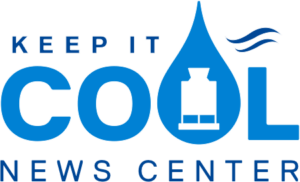
For evaporative cooling towers to work effectively, they must use water. But water usage will vary greatly depending on the style of tower, the application and the conditions of the water entering the system. Below are some FAQs we hear often as manufacturers of cooling towers; the answers here might help you understand more about water usage in your new or existing mechanical system.
Do evaporative cooling towers waste a lot of water?
It’s been said that “the purpose of a cooling tower is to conserve water. It fulfills its purpose by rejecting heat to the atmosphere by convective and evaporative heat transfer.” (Power Magazine, 2009) The only water “lost” is the pure water that is evaporated; the remaining cooled water is eventually blown down, or drained, and sent back into the water system.
Generally speaking, the lower the heat load and/or ambient temperature, the less evaporation. The higher the system’s cycles of concentration (COC), the lower the blowdown. For more about limiting evaporation and/or blowdown, see our white paper, “How to Conserve Water in Evaporative Cooling Towers.”
Do water-cooled towers use more water than air-cooled towers?
Water-cooled towers, like the Marley NC® Everest® Cooling Tower, use far less energy than air-cooled solutions on-site. But, operators of water-cooled solutions may see higher water usage and costs at their location. Keep in mind, as stated in ASHRAE Journal, “the hidden reality is that air-cooled or alternative systems consume more energy on-site [AND] use substantially more water at the power generation site… (“A Review of Evaporative Cooling’s Efficiency and Environmental Value.”)
Another water-saving option that’s becoming more popular for a variety of applications is an adiabatic cooling system. For example, the Marley® OlympusV® Adiabatic Series balances the water-saving benefits of an air-cooled heat rejection system with the energy efficiency of a water-cooled solution to provide flexible cooling for a variety of operations.
How do I know how much water I am using or will use?
There are several tools available from manufacturers to help determine cooling tower water estimates. If you know conditions of your specified/installed cooling solution, you can enter them into the Marley Water Calculator. This tool can also help you identify how specific conditional alterations might help you limit water usage.
If you need help determining the conditions of your project or building, a nearby Marley representative can help you gather the right information and find the best solution for your water conservation efforts.
Can changing my circulating flow rate reduce my water usage?
In short, no. Evaporation rate closely follows heat load, regardless of whether water flow rate is high or low. The liquid-to-gas ratio – also known as L/G (defined as mass flow of water divided by mass flow of air) – has a small impact on evaporation. If the amount of water is less than the amount of air (a low L/G ratio), more evaporation can occur and vice versa. A product’s configuration and target thermal conditions dictate the airflow required. A makeup water optimizer like the Marley WaterGard™ system might be a better option in some cases, which can limit water use onsite without adjusting your flow rate.
Does evaporation rate change based on location?
Yes, evaporation is directly impacted by the ambient conditions. The air in warm, dry climates is very low relative humidity. This atmosphere naturally can accept more water vapor, which drives up evaporation rate. Conversely, a product with the same configuration installed in a more-humid environment will display a lower evaporation rate.
Another primary factor is elevation. Barometric pressure decreases as you reach higher altitudes and, in turn, evaporation rate increases.
In the end, there are no universal rules that apply to water usage in every application and climate zone. The drivers of water usage in cooling towers are heat load, climate, and load profile throughout the year – and water quality can also play a major role.
If saving water is important to you and your mechanical system, learn about more water-saving options and/or contact your local Marley representative.

